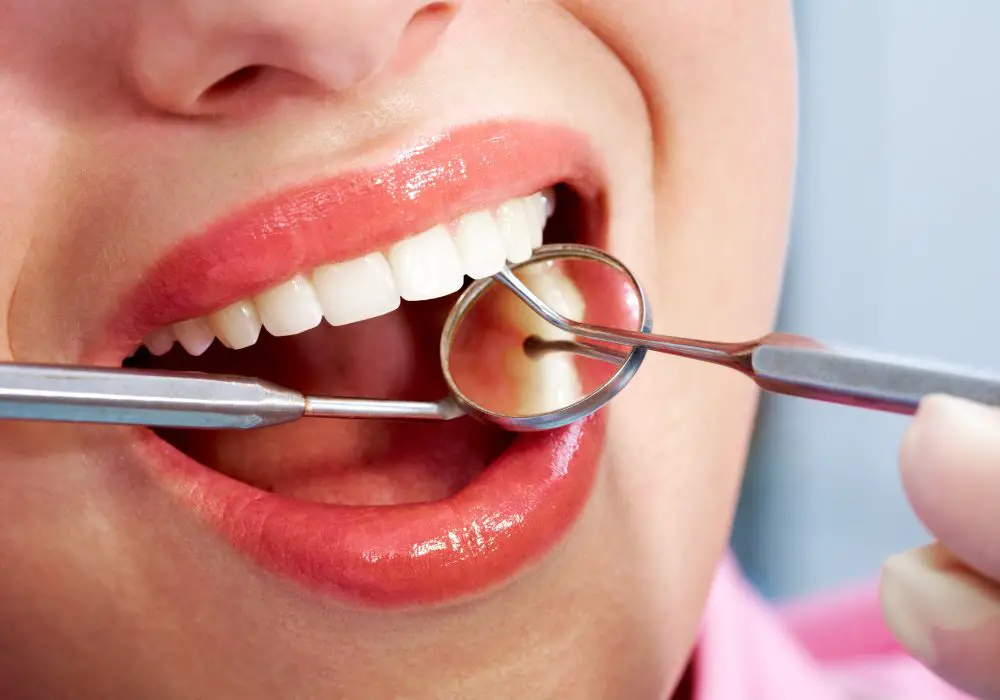Taking care of your teeth is an essential part of maintaining good health. Not only does it help you maintain a beautiful smile, but it can also prevent serious health problems. Many people do not realize that poor dental hygiene can lead to a variety of diseases and health issues. In this article, we will explore the question: can you get sick from not taking care of your teeth?
The answer is yes. Neglecting your oral health can lead to a range of health problems, from minor issues like bad breath and tooth decay to more serious conditions like periodontitis and heart disease. Poor dental hygiene can also lead to infections in the mouth, which can spread to other parts of the body and cause serious health problems. In this article, we will discuss some of the ways that neglecting your teeth can impact your overall health and well-being.
It is important to understand that taking care of your teeth is not just about brushing and flossing regularly. It also involves regular dental check-ups and cleanings, a healthy diet, and avoiding harmful habits like smoking and excessive alcohol consumption. By taking care of your teeth and gums, you can help prevent a range of health problems and maintain good overall health.
Understanding Dental Health

Taking care of your teeth and gums is essential for your overall health and well-being. Neglecting your dental health can lead to a variety of problems, both in your mouth and throughout your body. Here are some important things to keep in mind when it comes to dental health:
Brushing and Flossing
Brushing your teeth at least twice a day and flossing daily are crucial for maintaining good dental health. Brushing removes plaque and food particles that can cause tooth decay and gum disease, while flossing helps to clean between teeth and remove plaque and debris that your toothbrush can’t reach.
Diet
What you eat can have a big impact on your dental health. Eating a balanced diet that is low in sugar and high in nutrients can help keep your teeth and gums healthy. Foods that are high in sugar and starch can lead to tooth decay and gum disease, so it’s important to limit your intake of these foods.
Regular Dental Checkups
Regular dental checkups are important for maintaining good dental health. Your dentist can check for signs of tooth decay and gum disease, as well as provide professional cleanings to remove plaque and tartar buildup. It’s recommended that you see your dentist at least once every six months.
Oral Health and Your Overall Health
Your oral health is closely linked to your overall health. Poor dental health has been linked to a variety of health problems, including heart disease, stroke, and diabetes. Taking care of your teeth and gums can help reduce your risk of these and other health problems.
In summary, taking care of your dental health is essential for your overall health and well-being. Brushing and flossing regularly, eating a healthy diet, and seeing your dentist regularly can help keep your teeth and gums healthy and prevent a variety of health problems.
The Link Between Oral Health and General Health
Taking care of your oral health is not only important for the well-being of your teeth and gums, but it can also have a significant impact on your overall health. Neglecting your oral health can lead to a variety of health problems, including:
- Cardiovascular disease: Poor oral health has been linked to an increased risk of heart disease, stroke, and atherosclerosis. This is because the bacteria that cause gum disease can enter your bloodstream and cause inflammation throughout your body.
- Respiratory infections: The same bacteria that cause gum disease can also travel to your lungs and cause respiratory infections such as pneumonia.
- Diabetes: People with diabetes are more susceptible to gum disease, and gum disease can make it difficult to control blood sugar levels.
- Pregnancy complications: Pregnant women with gum disease are more likely to experience premature birth and low birth weight.
- Dementia: Studies have shown that poor oral health may be linked to an increased risk of developing dementia later in life.
Maintaining good oral health can help prevent these and other health problems. This includes brushing your teeth twice a day, flossing daily, and visiting your dentist regularly for checkups and cleanings. Additionally, a healthy diet low in sugar and high in fruits and vegetables can also help promote good oral health.
In conclusion, taking care of your oral health is essential for your overall health and well-being. By practicing good oral hygiene habits and seeking regular dental care, you can help prevent a variety of health problems and maintain a healthy smile for years to come.
Common Dental Health Issues and Their Impact on General Health

Taking care of your teeth is not only important for a beautiful smile, but also for your overall health. Neglecting your dental health can lead to various issues that can impact your general health. Here are some of the common dental health issues and their impact on general health.
Tooth Decay
Tooth decay is a common dental problem caused by the build-up of plaque on teeth. Plaque is a sticky film of bacteria that forms on teeth and produces acid that can erode tooth enamel. If left untreated, tooth decay can lead to cavities, which can cause pain and infection. Tooth decay can also lead to bad breath and difficulty eating, which can affect your overall health.
Gum Disease
Gum disease, also known as periodontal disease, is a bacterial infection that affects the gums and bone that support the teeth. It is caused by the build-up of plaque on teeth and can lead to inflammation, bleeding, and swelling of the gums. If left untreated, gum disease can lead to tooth loss and can increase the risk of other health problems such as heart disease and diabetes.
Oral Cancer
Oral cancer is a serious condition that affects the mouth and throat. It can be caused by various factors such as smoking, alcohol consumption, and exposure to the sun. Symptoms of oral cancer include mouth sores, red or white patches in the mouth, and difficulty swallowing. If left untreated, oral cancer can spread to other parts of the body and can be life-threatening.
Taking care of your dental health is important for your overall health. Regular dental check-ups, brushing twice a day, flossing, and avoiding sugary and acidic foods can help prevent dental health issues. If you experience any dental health issues, it’s important to seek professional dental care as soon as possible.
Preventive Measures for Dental Health
Taking preventive measures for dental health can help you avoid various oral health problems. Here are some simple steps you can take to keep your teeth and gums healthy:
Regular Dental Check-ups
Regular dental check-ups are essential to maintain good oral health. You should visit your dentist at least twice a year for a routine check-up. During the check-up, your dentist will examine your teeth and gums, and look for any signs of tooth decay, gum disease or other oral health problems.
Your dentist may also recommend dental X-rays to detect any hidden problems in your teeth or jawbone. Early detection of dental problems can help prevent more serious issues down the road.
Proper Brushing and Flossing
Proper brushing and flossing are critical for maintaining good oral health. You should brush your teeth at least twice a day with fluoride toothpaste. Make sure to brush all surfaces of your teeth, including the fronts, backs, and chewing surfaces.
Flossing is also essential to remove plaque and food particles from between your teeth. You should floss at least once a day, preferably before bedtime.
Healthy Diet
A healthy diet can also help prevent dental problems. Avoid sugary and acidic foods and drinks, which can erode tooth enamel and cause cavities. Instead, eat a balanced diet rich in fruits, vegetables, and whole grains.
Drinking plenty of water can also help keep your mouth clean and hydrated. Water helps wash away food particles and bacteria that can cause bad breath and tooth decay.
By following these simple preventive measures, you can maintain good oral health and avoid various dental problems. Remember to visit your dentist regularly, brush and floss properly, and eat a healthy diet for optimal dental health.
The Risks of Neglecting Dental Health

Taking care of your teeth is not just about having a bright smile and fresh breath. Neglecting dental health can have serious consequences for your overall health. Here are some of the risks associated with poor dental hygiene:
Heart Disease
Research has shown that there is a link between gum disease and heart disease. The bacteria that cause gum disease can enter your bloodstream and attach to the fatty deposits in your heart’s blood vessels, leading to blood clots and potentially even a heart attack. So, if you don’t take care of your teeth, you could be putting your heart at risk.
Diabetes
People with diabetes are more likely to develop gum disease, and gum disease can make it harder to control blood sugar levels. This can create a vicious cycle, as high blood sugar levels can also make gum disease worse. If you have diabetes, it’s especially important to take good care of your teeth and gums.
Pregnancy Complications
Pregnant women with gum disease may be more likely to have premature or low birth weight babies. This is because the bacteria that cause gum disease can enter the bloodstream and affect the developing fetus. So, if you’re pregnant, it’s important to take extra care of your dental health to protect your baby.
In addition to these risks, neglecting your dental health can also lead to tooth decay, tooth loss, bad breath, and other unpleasant consequences. So, make sure you brush and floss regularly, and visit your dentist for regular checkups and cleanings. Your overall health depends on it!
Frequently Asked Questions
What happens if you don’t brush your teeth for a week?
If you don’t brush your teeth for a week, bacteria will start to build up in your mouth, leading to bad breath and a higher risk of cavities and gum disease. You may also notice that your teeth feel fuzzy or slimy.
What happens if you don’t brush your teeth for 20 years?
If you don’t brush your teeth for 20 years, you may experience severe tooth decay, gum disease, and tooth loss. You may also experience pain, difficulty eating, and other health problems.
What happens if you don’t brush your teeth for months?
If you don’t brush your teeth for months, you may experience bad breath, cavities, and gum disease. You may also notice that your teeth feel sensitive or painful.
Can not brushing teeth make you have a sore throat?
Not brushing your teeth can contribute to the growth of harmful bacteria in your mouth, which can potentially lead to a sore throat. However, a sore throat can also be caused by other factors, such as a viral or bacterial infection.
What happens if you don’t brush your teeth for a year?
If you don’t brush your teeth for a year, you may experience severe tooth decay, gum disease, and tooth loss. You may also experience pain, difficulty eating, and other health problems.
Can teeth problems cause illness?
Yes, teeth problems can cause illness. For example, gum disease has been linked to an increased risk of heart disease, stroke, and other health problems. Additionally, untreated tooth infections can lead to serious infections in other parts of the body.







